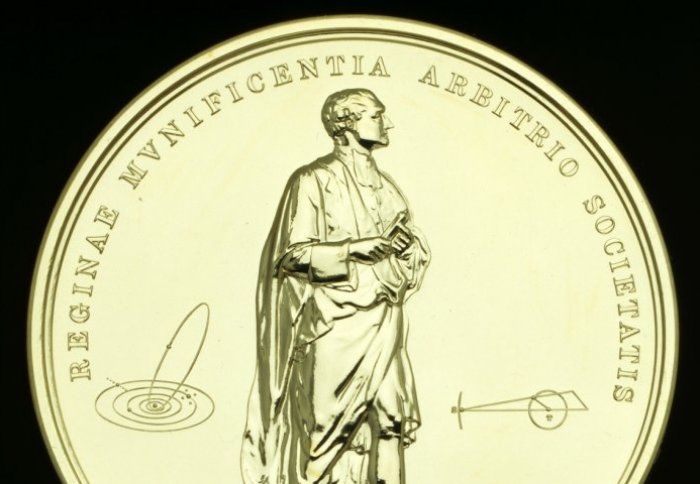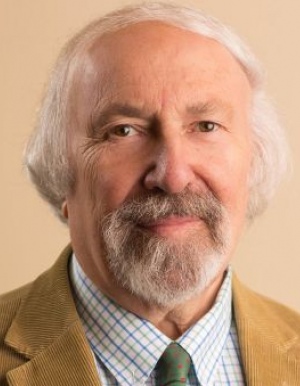Mass spectrometry expert receives Royal Society medal

The reverse face of the Royal Medal, featuring Sir Isaac Newton
An Imperial biochemist whose work pushed the boundaries of mass spectrometry has been awarded the 2014 Royal Society Royal Medal.
Research by Emeritus Professor of Biological Chemistry Howard Morris FRS has improved our understanding of living systems at the molecular level, in health and disease, by using advanced spectrometry to elucidate the structures of newly discovered, biologically active materials.

Emeritus Professor Howard Morris FRS
The Royal Society award recognises Professor Morris’s pioneering work in biomolecular mass spectrometry, including contributions to strategy and instrument design. The award also recognises his outstanding entrepreneurship in accelerating the release of new medicinal products by characterising biopharmaceutical molecules.
The Royal Medals, which are also known as the Queen’s Medals, are awarded annually for the most important contributions in the physical, biological and applied sciences.
On hearing about the award, Professor Morris, from Imperial’s Department of Life Sciences, said: “I am very honoured personally, but I am also incredibly pleased for our research group, now led by Professor Anne Dell FRS, our Department, and the College as a whole. The award is a testament to our scientific research, recognising and celebrating the high-quality work carried out here at Imperial.”
The award is a testament to our scientific research, recognising and celebrating the high-quality work carried out here at Imperial
– Professor Howard Morris FRS
Department of Life Sciences
Professor Murray Selkirk, current Head of the Department of Life Sciences said: “Professor Morris has achieved the rare success of combining a stellar academic research and teaching career with world-leading entrepreneurship. He has also served the College with distinction in leadership roles. I am delighted that he has been recognised with this enormously prestigious medal”
Professor Morris has worked in the field for almost 50 years. He joined Imperial in 1975 and has been both Head of the Department of Biochemistry and Joint Head of the Life Sciences Division. He received his BSc and PhD from the University of Leeds, where he achieved the first mass spectrometric sequencing of protein-derived peptides in the late 1960s. He spent his initial post-doc days at the University of Cambridge Chemical Laboratory, and then at the MRC Laboratory of Molecular Biology, Cambridge.
Professor Morris founded the Imperial College Biomolecular Mass Spectrometry Group in 1975. At the time, mass spectrometry instruments were designed to investigate low molecular weight chemicals, rather than explore more complex, involatile biochemicals with higher molecular weight, such as proteins and carbohydrates. He spent much of his career addressing this limitation by working to improve the design and push the boundaries of instruments so that they could address more effectively the special problems of size, polarity, complexity and sensitivity associated with important biological problems, contributing to a number of developments including the widely used Q-TOF instruments.
Professor Morris’s research has made significant contributions to proteomics and glycoproteomics - our understanding of the structure and function of proteins and glycoproteins. He elucidated the structure of several natural products including enkephalin, the first endorphin to be discovered. Many of the strategies and protocols used in mass spectrometric laboratories today are based on his early work, such as his concept for simultaneous sequencing of multiple peptides, which led to peptide “mapping”.
Professor Morris has also founded two businesses to apply his mass spectrometry mapping and sequencing strategies to the biotechnology and pharmaceutical industries. He set up the consultancy and analysis company M-SCAN in 1980, which merged with SGS in 2010. And he founded Biopharmaspec in 2014 to work on pre-clinical projects, such as characterising a new class of pharmaceutical known as antibody drug conjugates.
Professor Morris has published over 400 peer reviewed publications, including 14 Nature and five Science papers. He retired from his full-time Chair in 2001, after 21 years as Professor of Biological Chemistry, and continues to work as a Senior Research Investigator, helping Imperial research students and colleagues with their work. His wife, Dr Maria Panico, has also been a key stalwart of this research, with 34 years of service to the College.
Article supporters
Article text (excluding photos or graphics) © Imperial College London.
Photos and graphics subject to third party copyright used with permission or © Imperial College London.
Reporter
Natasha Martineau
Enterprise